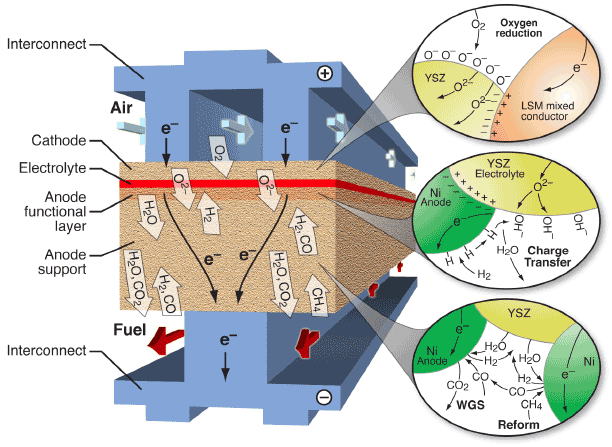This ONR-sponsored Multidisciplinary University Research Initiative (MURI), which is led from CSM, is collaborative with Caltech and the University of Maryland. This 5-year program focuses on the fundamental physics and chemistry of direct electrochemical oxidation processes in solid-oxide fuel cells. The team is comprised of nine principal investigators:
Colorado School of Mines: Profs. , , , and
Caltech: David G. Goodwin, Sossina Haile, and William Goddard, III
Univ. of Maryland: Gregory S. Jackson, Robert Walker, and Bryan Eichhorn
Technical Objectives
Our objective is to gain a fundamental understanding of DECO-through experiments and validated models. With the enhanced physiochemical understanding and the accompanying capability to simulate the underlying processes, important advances can be made in fuel-cell design, especially in anode/electrolyte microstructure. The multi-disciplinary research will accelerate fuel-cell technology development by achieving the following objectives:
-
Document fundamental experimental results to quantify critical rate-limiting steps for both electro-oxidation and non-electrochemical pre-oxidation of selected fuels,
-
Provide detailed membrane/electrode assembly models that quantify the influence of electrode/electrolyte microstructure, composition, and materials properties for current and potential new SOFC materials,
-
Develop simulation tools, including critical chemistry and transport sub-models, for evaluating fuels and fuel blends in high performance DECO, principally in SOFC.
While our primary effort centers on SOFC, with oxygen-ion-conducting electrolytes, the fundamental modeling tools are highly relevant to high-temperature proton-conducting systems.
Technical Approach
Our technical approach is built on a strong foundation that is composed of three, closely coupled, elements. These elements blend fundamental chemistry theory, ranging from an atomic-level quantum-chemical perspective through elementary chemical kinetics, with experiments that are specifically designed to reveal essential chemical and physical process:
-
Develop first-principles theory and models to represent the heterogeneous chemistry and electro-oxidation of selected hydrocarbon fuels (including oxygenated fuels) along with appropriate homogeneous reaction mechanisms. These theories are informed by and validated with experimentation.
-
Develop benchmark experimental facilities for isolating and measuring chemical and electrochemical behavior of potential alternative logistic hydrocarbon fuels in high temperature fuel-cell environments, including the effects of catalyst-loaded electrode materials and new electrolyte materials. The experiments are designed carefully to isolate and elucidate specific physical and chemical processes to support the theoretical effort.
Develop chemical-transport models, which incorporate results from the theoretical and experimental efforts. These models represent the coupled interactions between the solid-phase, surface, and gas-phase processes and thus provide the necessary framework for understanding the rate-controlling phenomena that govern fuel-cell performance.
Fundamental Chemistry and Physics of Direct-Oxidation in Solid-Oxide Fuel Cells
